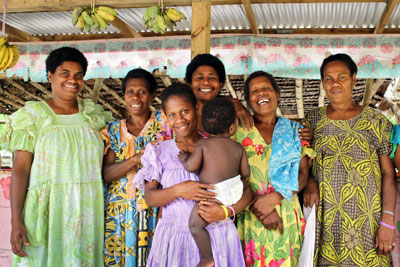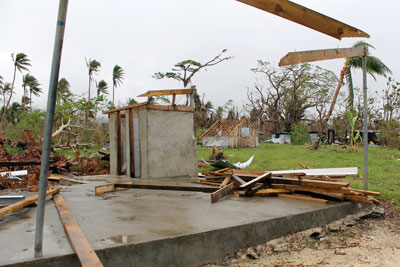Black Friday destroys village livelihoods in Vanuatu
Date:

Just six months ago the Epau ring road market on Efate Island in Vanuatu was hosting UN Women’s International Day of Rural Women celebrations. The new structure had recently been finished, including a kitchen so the market vendors could cook hot food, and have access to toilets.
That changed on the night of 13 March – Friday the 13th – when Category Five Tropical Cyclone Pam ripped through Vanuatu. The UN Office of Humanitarian Affairs estimates that 166,600 people have been affected (that’s more than half the population of 277,000) has been affected, with 75,000 people in need of temporary shelter.
Now, all that remains of the new Epau market structure is a concrete slab, a broken toilet and piles of twisted sheet iron and wood.
“On the morning after the cyclone came we all went outside and had a little cry,” market vendor Annie James says. “Everything was gone. Everyone has suffered.”
As one of 21 small village-based markets on the ring road around Efate Island, Epau was a stopping point for commuters and tourists looking for fresh produce from the market vendors’ own garden plots. The bell in the corner alerted those in the village when the cooked food was ready for purchase and there were rarely any leftovers.
It was run by the village’s women and for many it was their sole source of income, paying for their children’s school fees, transportation and other basic needs. A total of 70 women sold produce through the market, working on a schedule so that only two had to be on duty at a time. Efficient financial record-keeping ensured each woman was paid her dues at the end of each day and that the market council had a small amount of money for maintenance.

Now, not only have their lost their source of food and income, many have also lost their homes. Annie’s kitchen and much of her house was destroyed; fellow market vendor Leisong Bob lost her living room and kitchen. They and their children – four for Annie, five for Leisong – are relying on tarpaulins, rice and tinned fish from relief agencies. While they have running water, it is only safe for washing. Drinking water has to be brought in from Port Vila.
“At the moment, to get to where our gardens used to be, we have to climb over trees, but some people are replanting,” Annie says. “Others are busy with their houses. Our priority is our homes, then the ring road market.”
The market is one of five ring road markets participating in UN Women’s Markets for Change project, which promotes gender equality and women’s empowerment by training and supporting market vendors, the majority of whom are women. The six-year initiative officially launched in Vanuatu in August 2014, seeks to inject more than USD 17 million into improving infrastructure and making markets in Fiji, Solomon Islands and Vanuatu safer, more inclusive and non-discriminatory. The bulk of this funding has come from the Australian Government.
On Efate, many of the market structures themselves have been badly damaged or destroyed, and the villages have lost almost all of their crops. As the focus begins to shift to early recovery, UN Women’s Vanuatu team is working with the market vendors, provincial and local government and the Australian government to shift priorities and allocated funding towards helping these women restore their livelihoods and build resilience against future shocks.
The women estimate it will be three months before they have enough to sell, and discussions are being held with the village chiefs about the possibility of moving the market back to its original spot – on land that is owned by the church – while the infrastructure is rebuilt. If the ring road market is not ready they will have to pay for transportation to get to the main market in Port Vila, as well as rent for a table, all of which significantly reduces their daily income.
Area Councillor Joseph Kalpeau says the destruction of such a main source of income is a major concern and also points to the pile of rubble that was previously a workshop for women trained as solar engineers. Before the cyclone, they had installed solar electricity units in around 40 households as part of a joint initiative between India’s Barefoot College, UN Women and the Vanuatu Government.
“We weren’t able to get the equipment out in time so most of it is ruined,” Joseph says. “The sea came right up through the trees as well as the rain that fell. Some of the units that had already been installed also didn’t make it through the storm.”